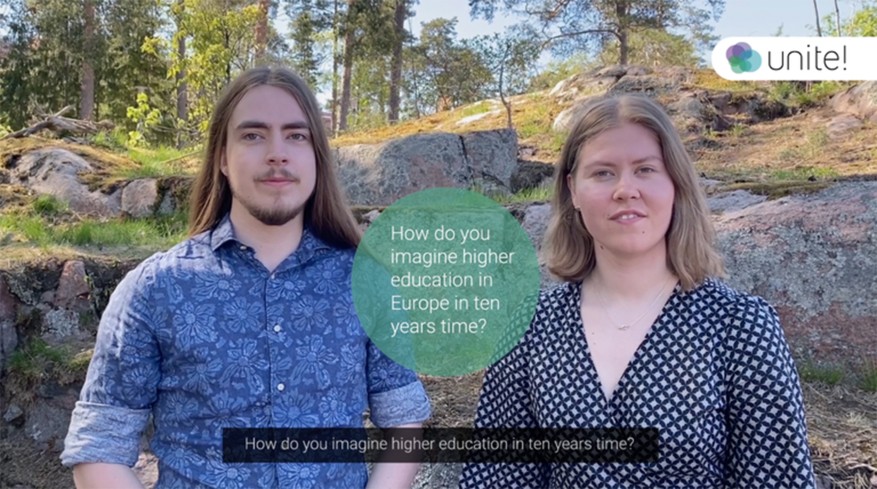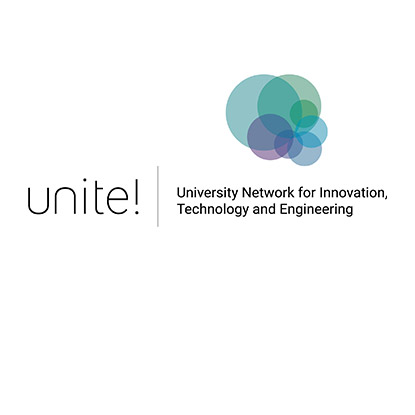Let's Unite! – Get to know Airi Nevalainen und Joona Huikuri
The Unite! community introduces itself
2022/09/16
Unite! is a living and constantly growing alliance. Many people at the seven (soon to be nine) partner universities are working on different projects to make a European University a reality. Who they are and what exactly they do is what we show in the series “Let's Unite! – Get to know…”. This time, students Airi Nevalainen and Joona Huikuri from Aalto University introduce themselves.

A few months ago, Aalto University students Airi Nevalainen and Joona Huikuri started as Aalto's student representatives in the Unite! SURE! Airi Nevalainen has just graduated with a bachelor's degree in economics and started her master's studies. Joona Huikuri is studying in the Information and Service Management program at the School of Business and is currently graduating with a bachelor's degree. In addition to their studies, both have been involved in a wide range of activities. Airi has worked e.g. on the Board of Aalto Economics, and as the student representative of the School of Business's teaching competence assessment group. Joona has founded a couple of student associations, and has also served for two years as vice chairman of the higher education committee of KY, the Aalto university business school students’ association.
What is your role in Unite?
Airi and Joona: The role of Unite's student representative is surprisingly diverse. We are part of the SURE! network, which brings together student representatives from Unite! universities. We meet once a month. We are also starting to work on an IDEM (Inclusion, Diversity, Equity in Mobility) project to improve the mobility of all students. We are also involved in the Unite! Academic Forum meetings and Aalto's own Unite! meetings, where we get to bring out the student perspective in an excellent way.
Recommended external content
We have selected external content from YouTube for you and would like to show it to you right here. To do this, you must reveal it with one click. You can hide the external content at any time with another click.
I agree to external content from YouTube being shown to me. This may result in personal data being transmitted to third-party platforms. You can find more information in our Privacy Policy.
You have worked with Unite! for a few months now. How does it feel?
Airi: Little by little, I’m internalising what Unite! is all about and how the alliance operates. The beginning has been a bit confusing and it feels like information is flooding like a tidal wave. Now, however, I am moving more confidently forward.
Joona: There was not much introduction to the Unite!'s student representative role, so my main focus has been to get a grip on all the flood of information. Now that I begin to understand the alliance and how it works, I can better focus on bringing the perspective of students to all of the Unite bodies in which I work.
From your point of view, what is the advantage of working or studying at a Unite! university? What do you think is special about the Unite! Alliance?
Airi: If Unite! is successful in reaching its goals it could offer students many new opportunities in terms of both course offering and mobility. I flag them also myself, so it's great to be involved in the project. I am also extremely interested in cultural differences and find it interesting to see at the grassroots level how cooperation is built between different academic cultures.
Joona: The purpose of Unite! is to create a degree-granting meta-campus between all its member universities. However, this sounds like a rather distant idea to me. I don’t think this will be fully realized at least during my studies. The corona pandemic canceled my bachelor exchange twice and I had to make many preparations twice for an exchange period that never happened. Unite! could allow students an easier exchange experience where certain courses can be taken at different universities in Europe. Being able to choose courses that best match your degree would also make the most of the “exchange”, which seems to be rare, especially in bachelor exchanges. International co-operation can also facilitate other practical issues that act as a barrier or a barrier to inter-university mobility.
How can we better reach students and get them involved in Unite?
Airi: Unite! is currently, I think, hidden from students. I came across this myself by chance, but luckily so. Unite! should have a stronger presence on social media and websites on its campuses to reach more visibility. Students won’t find Unite!'s own channels until they have received information about the alliance's opportunities elsewhere.
Joona: Unite! is currently rather poorly visible to the students. I think Unite! could be better visible on the social media, as well as at orientation week events and on the stage of the student show Speksi, so that students could hear about Unite! and the opportunities it offers. Unite! does not yet offer studies suitable for all Aalto graduates. This makes communication challenging, because as an economist, for example, Unite's offerings in the field of architecture or energy technology don’t really match with my own interests.
Unite!/mho
About SURE!
SURE! stands for Students in Unite! for Representation and Empowerment, this body provides the opportunity for students to co-create and engage with their companions from the other partner universities of the alliance but also to have a platform in order to voice their needs within the Unite! management structure.
About Unite!
Alongside TU Darmstadt as the coordinator, Unite! (University Network for Innovation, Technology and Engineering) also includes Aalto University (Finland), KTH Royal Institute of Technology (Sweden), Grenoble Institute of Technology (France), Politecnico di Torino (Italy), Universitat Politècnica de Catalunya (Spain) and Universidade de Lisboa (Portugal).
The seven partner universities aim to use the European University to create a trans-European campus for students and researchers with the involvement of regions and companies. The partners have a total of 167,000 students, already cooperate closely in more than 80 EU projects and have exchanged more than 2,000 students in the past five years. The alliance has set itself the goal of combining courses for the benefit of students, breaking down existing technical and administrative hurdles, and thus significantly increasing student mobility. Research will also benefit from the conditions created for larger and easier cooperation, which will strengthen the competitiveness of the European Higher Education Area overall.

